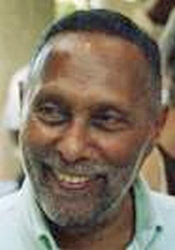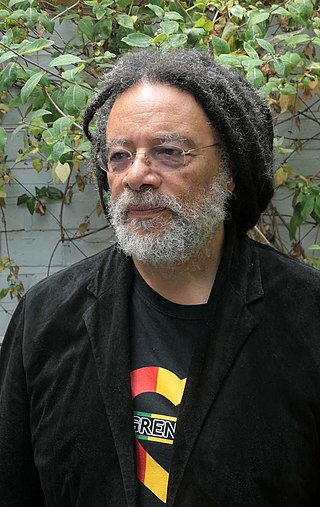
Stuart Henry McPhail Hall was a Jamaican-born British Marxist sociologist, cultural theorist, and political activist. Hall — along with Richard Hoggart and Raymond Williams — was one of the founding figures of the school of thought known as British Cultural Studies or the Birmingham School of Cultural Studies.

Paul Gilroy is an English sociologist and cultural studies scholar who is the founding Director of the Sarah Parker Remond Centre for the Study of Race and Racism at University College London (UCL). Gilroy is the 2019 winner of the €660,000 Holberg Prize, for "his outstanding contributions to a number of academic fields, including cultural studies, critical race studies, sociology, history, anthropology and African-American studies".
Graeme Turner is an Australian professor of cultural studies and an Emeritus Professor at the University of Queensland. During his institutional academic career he was a Federation Fellow, a President of the Australian Academy of the Humanities, founding Director of the Centre for Critical and Cultural Studies at the University of Queensland, and Convenor of the ARC Cultural Research Network.

Stuart Cunningham is Distinguished Emeritus Professor of Communication and Media Studies at QUT.
Juan Francisco Salazar is a Chilean anthropologist and filmmaker. He has lived in Sydney, Australia since 1998. He is professor of media studies at the School of Humanities and Communication Arts and Fellow of the Institute for Culture and Society (ICS). From 2020 he is an Australian Research Council Future Fellow.

Armand Mattelart is a Belgian sociologist, known as a leftist French scholar. His work deals with media, culture and communication, specially in their historical and international dimensions.
Danny Ben-Moshe is a documentary film maker and an associate professor at Deakin University in Melbourne, Australia. He has produced and directed several critically praised documentaries.
The RMIT School of Applied Communication was an Australian tertiary education school within the College of Design and Social Context of RMIT University. The school hosted RMIT's Advertising, Communication Design, Editing and Publishing, Journalism, Media, Professional Communication and its Public Relations programs. It merged with the RMIT School of Creative Media on 6 July 2009 to form the RMIT School of Media and Communication.

News is information about current events. This may be provided through many different media: word of mouth, printing, postal systems, broadcasting, electronic communication, or through the testimony of observers and witnesses to events. News is sometimes called "hard news" to differentiate it from soft media.

Leaving Springfield: The Simpsons and the Possibility of Oppositional Culture is a non-fiction compilation work analyzing the effect of the television program The Simpsons on society, edited by John Alberti. The book was published in 2004 by Wayne State University Press. Contributors to the work include academics associated with Northern Kentucky University, the University of Wisconsin–Stevens Point, The Australian National University, and the University of Sydney.
Thomas ("Tom") Andrew O'Regan was a Professor of Cultural and Media Studies at the University of Queensland.
Frances Negrón-Muntaner is a Puerto Rican filmmaker, writer, and scholar. Her work is focused on a comparative exploration of coloniality, primarily in Puerto Rico and the United States, with special attention given to the intersections between race, ethnicity, gender, sexuality and politics. She is an associate professor of English and Comparative Literature and Director of the Center for the Study of Ethnicity and Race at Columbia University in New York City. She has also contributed to the Huffington Post, El Diario/La Prensa, and 80 Grados, and since 2008 has served as a Global Expert for the United Nations Rapid Response Media Mechanism. She is one of the best-known Puerto Rican lesbian artists currently living in the United States.
The study of global communication is an interdisciplinary field focusing on global communication, or the ways that people connect, share, relate and mobilize across geographic, political, economic, social and cultural divides. Global communication implies a transfer of knowledge and ideas from centers of power to peripheries and the imposition of a new intercultural hegemony by means of the "soft power" of global news and entertainment...
Lê Quang Quý Trang Đài, also known by the stage name Lynda Trang Đài, is a Vietnamese American singer. She has appeared in many of the Paris By Night shows of Thuy Nga Productions, for example Paris By Night 36, 59, 66, 93, 94 and 100. She is noted as one of the first more provocative Vietnamese-American performers. Her racy costumes and stage antics have earned her the title "the Vietnamese Madonna," "well established but very controversial" (1999) "notoriously bold veteran" (2005). and so on.

Rosalind Clair Gill is a British sociologist and feminist cultural theorist. She is currently Professor of Social and Cultural Analysis at City, University of London. Gill is author or editor of ten books, and numerous articles and chapters, and her work has been translated into Chinese, German, Portuguese, Spanish and Turkish.

The history of advertising can be traced to ancient civilizations. It became a major force in capitalist economies in the mid-19th century, based primarily on newspapers and magazines. In the 20th century, advertising grew rapidly with new technologies such as direct mail, radio, television, the internet and mobile devices.
McDonaldisation, Masala McGospel and Om Economics is a book on the phenomenon of Christian televangelism in early 21st century urban India. The book was written in 2010 by Jonathan D. James of Edith Cowan University in Australia.
John Allen Hendricks is a professor whose research focuses on political communication, social media/new media technologies, and the broadcasting industry and is the author of more than ten books on the subjects. He has served as academic department chair since 2009.
Jeremiah P. Spence is a visiting professor at the University of Texas, Austin. He was an assistant professor at Erasmus University, Rotterdam, Netherlands. He taught Global and International Communication in the Erasmus School of History, Culture and Communication. He is a visiting researcher at Federal University of Bahia, University of Sao Paolo, and Federal University of Rio Grande do Sul.
Ramon Lobato is an author, researcher, and scholar of cultural industries. The focus of his research is on video distribution networks, and how they structure audience access, discovery, and content diversity. He is currently Associate Professor of Media and Communication at RMIT University in Melbourne, Australia.







